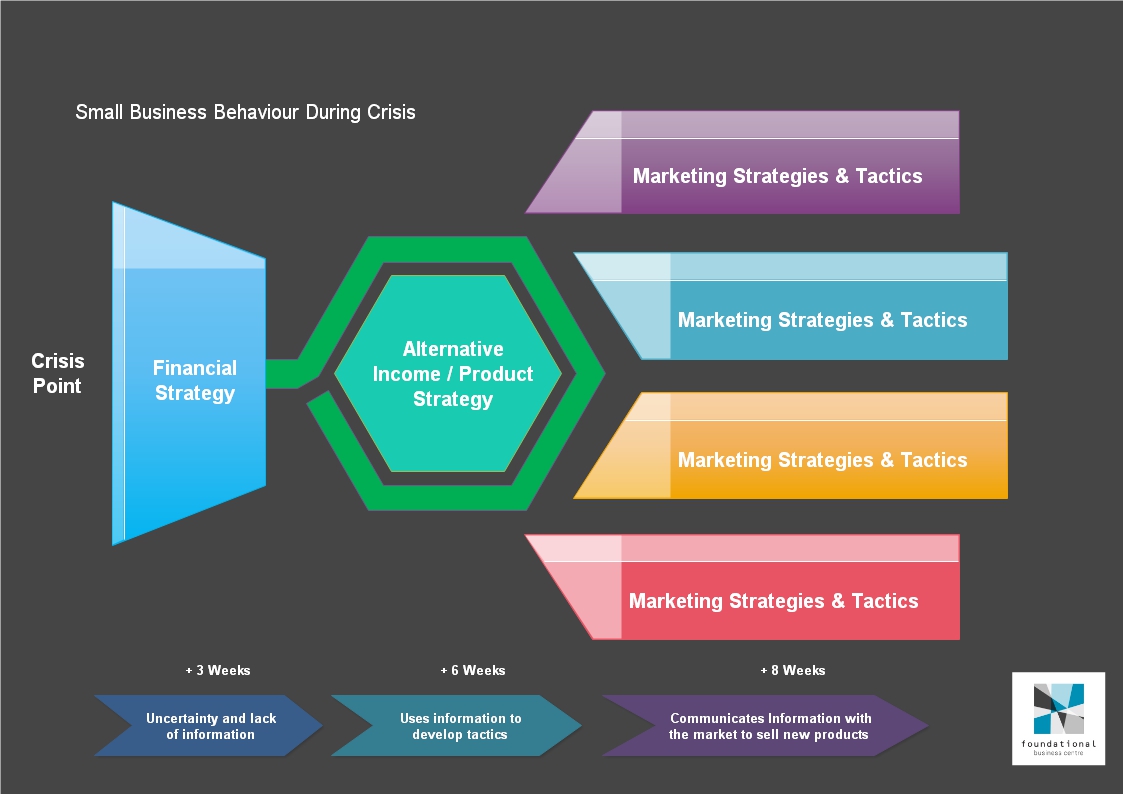How small businesses behave in a crisis has a pattern – Understanding that pattern can help your business to make good decisions.
Whats going on? Why are businesses sitting on their hands and not engaging during this COVID19 crisis? Understanding how Small Businesses behave in crisis is easier than you think.
There’s a simple reason for the behaviour you’re seeing right now. When people are faced with a crisis they look for information to help them make sense of what’s going on, and how to control their stress and fear. In the absence of concrete information they do nothing, except perhaps panic.
There are three key stages of strategic thinking that small business owners are going through. Understanding how Small Businesses behave in these stages, and determining where you and your customers are in this process helps you to be wise, patient, and plan your own tactics and timing for communicating with your customers.
If you rush to communicate what you have to offer before they are ready to hear about it, you’ll get frustrated and stressed for no reason, and might miss the window of opportunity.
The First Stage everyone goes through is the Financial Strategy Stage.
During the period immediately after a crisis, the first and only thing a business owner or customer can think about is their finances.
- How much money do we have?
- When will we run out of there’s no income coming in, or our doors are closed?
- Who can we still employ?
- Who will we need to stand down or make redundant to keep the business afloat?
- What suppliers do we need to contact to negotiate deferral and better pricing or postpone supply?
- What assistance can we get from government?
- Who do I need to communicate with to make sure they know we’re still operating, and what should we say?
This is an important stage in how small businesses behave in a crisis. Before they can entertain any thoughts of moving forward and getting creative with their business model they need to be somewhat certain of their worst case financial position. The longer it takes to get real and accurate information from government the longer they take to move through this phase of decision making.
The Second Stage that small businesses move into is the Alternative Income and Products Strategy stage.
Towards the end of completing their Financial Strategy business owners need to make a critical decision in their business:
Do I have the courage and appetite to fight for my business? Are we willing to reinvent ourselves, adjust our offering and service delivery?
Some business owners will decide that they just don’t want to take this challenge on, the cost of reinvention, of fighting is too big for them and their family. They may have been a few years off retirement, require new Licenses, Equipment and Staffing which means making a long term commitment and incurring significant costs that are too large or too risky to commit to, compared to the payoff.
If you’re faced with this option and you know winding your business down is the best choice for you and your business, that’s not failure, that’s wisdom. At some point we all have to exit our business, and if now is that time because of the options you have before you, then now is that time.
If the business owner has chosen to embrace the new challenges and fight on, they move on to Stage Two – Alternative Income & Products Strategy
Understanding how Small Businesses behave in this stage is critical. It is a dedicated time of reinventing the business model, products, go-to-market strategies and pricing structures. There are new opportunities everywhere, because nothing is off limits. It’s time to begin thinking laterally, consider collaborations and diversifying is key.
We can’t do business in the same way as we’ve done to date, and we will operate in the New Normal. We need to create new income streams by adapting existing, and inventing new products, services and customer segments.
This stage takes a lot of thinking, researching, getting help with your planning and modelling, before you build your new products or services and then can start telling people about your new business offerings.
Abraham Lincoln is famously quoted as saying
“If I had 8 hours to chop down a tree, I would spend 6 hours sharpening my axe.” It’s time to sharpen your axes ready to relaunch.
The Third Stage that small businesses move into is the Marketing Strategies and Tactics Stage.
If you’re a marketing business you’ve probably been asking yourself; why aren’t people out there banging down our doors to get help marketing themselves right now?
That’s because they’re still working through Stages One and Two. When those businesses have started to move through the Alternative Income & Products Strategy stage, they begin to think about how they’re going to tell customers and potential new markets about their great new and adapted products.
They will need help bouncing ideas off their Marketing Partners. They also need help predicting when to push out marketing of those products and services, in line with the various industries and their specific crisis life cycle.
Part of your research needs to be into what is happening in your target market segments to enable you to predict that ideal time to broadcast your offerings.
The bigger and more complicated a business is the longer they take to move through the life cycle stages. It’s like turning the Titanic to avoid the ice bergs ahead. The smaller more nimble businesses will move through the process quicker.
So if you’re a small business ready to offer new services to your larger customers, understanding how Small Businesses behave when they are larger is vital. You need to be patient with them and monitor when they move through to the next stage and are ready to talk to you about your offering. You won’t be able to rush them, in fact if you try to you’ll destroy your relationship with them by demonstrating a lack of empathy.

The Kubler-Ross Change Curve
In 1969 Elizabeth Kubler-Ross described five stages of grief in her book “On Death And Dying”. These stages represent the normal range of feelings people experience when dealing with change in their lives – or in the workplace. Everyone is working through these stages right now; you, your staff, your suppliers, your customers and their customers.
Right now mastering and understanding Buyer Behaviour and Supplier Behaviour is critical to your success. As quoted in a recent Forbes article on how consumer behaviour changes: “To get consumers to choose your brand, you need to build a positive impression that reaches them on a subconscious level.”
Foundational Business are focused on assisting small businesses to understand how Small Businesses behave in this crisis and find the help they need at each stage of the business journey so they can face the crisis and grow through it. You can find more information about the key planning services we have on our website
Or you call us today 1300 765 249 (1300 SMLBIZ)












 LinkedIn
LinkedIn Facebook
Facebook Instagram
Instagram